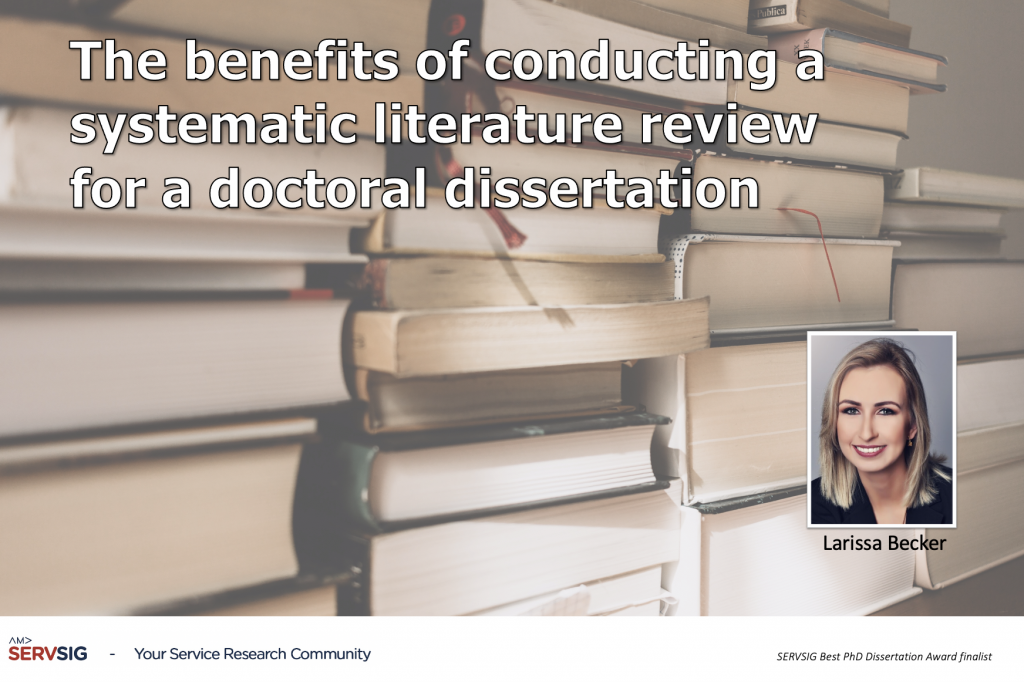
Guest article by Larissa Becker, finalist of the 2021 SERVSIG Best Dissertation Award.
I feel honoured to be among the finalists of SERVSIG Best Dissertation Award. Although a great dissertation depends on a combination of factors (e.g., theoretical and practical contributions, novelty, methodological rigor, supervision—big thanks to Dr. Elina Jaakkola and Dr. Aino Halinen-Kaila), I decided to talk about one thing that I believe made a difference when I was writing my dissertation: a systematic literature review. For the first article of my dissertation, my first supervisor, Dr. Elina Jaakkola, and I wrote a paper based on a combination of systematic literature review and metatheoretical analysis that organized the conceptual domain of customer experience through the development of four fundamental premises (Becker & Jaakkola, 2020).
The literature already mentions the many contributions a systematic literature can offer to a theory or conceptual domain (e.g., a research agenda, solving theoretical conflicts). In this article, I want to talk about those unseen contributions for the writer, especially doctoral students, and their future work. I want to focus on this topic because I have been asked more than once whether I recommend that doctoral students conduct a systematic literature review. I always answer that conducting one was very beneficial to me for many reasons that I list next.
A systematic literature review allowed me to know the literature in breadth and depth
Even though I had been reading many articles about customer experience (also, service experience, brand experience, experiential marketing, and many other labels) when I started my doctoral studies, I was still confused about what customer experience was. Elina was the one who suggested to conduct a systematic literature review that maybe could be an article. I am so glad she suggested that! The review allowed me to know the literature in breadth because I ended up reading many articles that I would not have if conducting a non-systematic review. The final number of articles included in the review was 136. But, maybe more important than that, I was not just reading these articles. I was coding and analyzing information that allowed me to obtain an in-depth understanding of the topic. The data analysis procedure forced me to scrutinize these articles in a way that I might not have done if I were just reading them and taking some notes.
The systematic literature review was the basis for other articles and the dissertation as a whole
I have to say that writing the second article of my dissertation was somewhat easy because I used the systematic literature as a basis for the problematization presented there. Having this big picture of the literature, I could identify the trends to a more broadened, consumer-centric perspective. This move of the customer experience literature then guided my two other articles (Becker, 2018; Becker et al., 2020) and the dissertation overall.
The systematic literature review gave me confidence
After carefully analyzing 136 articles for a few years, I felt confident of my knowledge of the customer experience literature (of course, I continued my search for customer experience literature beyond the review). I believe this is an important benefit for an early-career academic considering that we are very susceptible to impostor-syndrome. Confidence allowed me to aim high (the paper was published in the Journal of the Academy of Marketing Science) and to argue for the contribution of my research more convincingly.
Lastly, I would like to make a caveat. Even though I experienced these benefits, I do not think this is the best path for every and any doctoral dissertation. I see a systematic literature review as a method and not as a type of contribution by itself. Depending on the topic (e.g., very new topic with few previous articles), another avenue might be the best. So, if you, early doctoral student, identify a problem in your topic of research that should be solved with a systematic literature review, go ahead! I hope you can experience these benefits as well!

Larissa Becker
Postdoctoral research fellow in Marketing
Tampere University, Finland
– Becker, L. (2018). Methodological proposals for the study of consumer experience. Qualitative Market Research: An International Journal, 22(4), 465-490.
– Becker, L. & Jaakkola. E. (2020). Customer experience: Fundamental premises and implications for research. Journal of the Academy of Marketing Science, 48, 630-648.
– Becker, L., Jaakkola, E., & Halinen, A. (2020). Toward a goal-oriented view of customer journeys. Journal of Service Management, 31(4), 767-790.
Photo credit: Freestocks.


I am students in Bahir Dar university as PhD. candidate. So, I want to see the role of systemic review for dissertation.